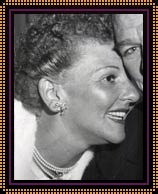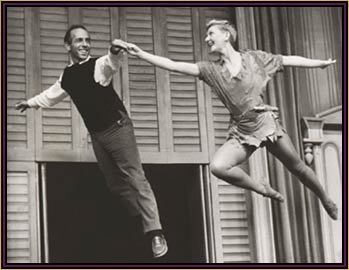Mary Martin
- "I Do! I Do!"
- "Jennie"
- "Leave It to Me!"
- "One Touch of Venus"
- "Peter Pan"
- "The Sound of Music"
- "South Pacific"
- Comden and Green
- Oscar Hammerstein II
- Gene Kelly
- Joshua Logan
- Cole Porter
- Richard Rodgers
- Jerome Robbins
- Jule Styne
- Kurt Weill
 A legendary star of the Broadway musical theater during the ’40s and ’50s, and one of its most charming, vivacious, and best-loved performers. Her father was a lawyer and her mother a violin teacher. She took dancing and singing lessons from an early age, married at 16, and eventually ran a dancing school herself before moving to Hollywood, where she auditioned constantly at the film studios and worked in nightclubs and on radio. After being spotted by the producer Lawrence Schwab, her first big break came on Broadway in 1938 when she won a secondary role, as Dolly Winslow, in the Cole Porter musical “Leave It to Me!”. Almost every night she stopped the show with her “sensational” rendering of “My Heart Belongs to Daddy” while performing a mock striptease perched on top of a large cabin trunk at a “Siberian” railway station. On the strength of her performance in that show she was signed to Paramount and made 10 films over a period of four years, beginning with THE GREAT VICTOR HERBERT in 1939.
A legendary star of the Broadway musical theater during the ’40s and ’50s, and one of its most charming, vivacious, and best-loved performers. Her father was a lawyer and her mother a violin teacher. She took dancing and singing lessons from an early age, married at 16, and eventually ran a dancing school herself before moving to Hollywood, where she auditioned constantly at the film studios and worked in nightclubs and on radio. After being spotted by the producer Lawrence Schwab, her first big break came on Broadway in 1938 when she won a secondary role, as Dolly Winslow, in the Cole Porter musical “Leave It to Me!”. Almost every night she stopped the show with her “sensational” rendering of “My Heart Belongs to Daddy” while performing a mock striptease perched on top of a large cabin trunk at a “Siberian” railway station. On the strength of her performance in that show she was signed to Paramount and made 10 films over a period of four years, beginning with THE GREAT VICTOR HERBERT in 1939.
Although her delightfully warm personality and theatrical star quality were not so effective on film, she did have her moments, particularly in RHYTHM ON THE RIVER (with Bing Crosby and Oscar Levant) and BIRTH OF THE BLUES, in which she joined Crosby and Jack Teagarden for “The Waiter, and the Porter and the Upstairs Maid.” She also sang the title song in KISS THE BOYS GOOD-BYE, which became a big hit for Tommy Dorsey, and duetted with Dick Powell on “Hit the Road to Dreamland” in STAR-SPANGLED RHYTHM. Other film appearances included LOVE THY NEIGHBOR, NEW YORK TOWN, HAPPY-GO-LUCKY, TRUE TO LIFE, and MAIN STREET TO BROADWAY (1953). While on the West Coast, she married for the second time, to Paramount executive Richard Halliday, who became her manager. In 1943 she returned to the stage and, after failing to reach Broadway with “Dancing in the Streets,” scored a great success with “One Touch of Venus,” which ran for 567 performances. The role of a glamorous statue that comes to life and falls in love with a human had originally been intended for Marlene Dietrich, but it fell to Martin to sing the haunting “Speak Low,” and the show established her as a true star. She followed it with “Lute Song,” the show which introduced Yul Brynner to Broadway, before returning to Hollywood to reprise “My Heart Belongs to Daddy” for the Cole Porter biopic NIGHT AND DAY.
A trip to London in 1947 for an appearance in Noël Coward’s “Pacific 1860” proved an unsatisfactory experience, and Martin returned to the USA to play the lead in a touring version of “Annie Get Your Gun.” Richard Rodgers and Oscar Hammerstein II’s smash hit “South Pacific” was next, and Martin’s memorable performance, funny and poignant in turns, won her a Tony Award. Starring with opera singer Ezio Pinza, she introduced several of the composers’ most endearing numbers, including “I’m Gonna Wash That Man Right Outa My Hair” (sung while she shampooed her hair on stage), “A Wonderful Guy,” “A Cockeyed Optimist,” and the hilarious “Honeybun.” “South Pacific” ran for 1,925 performances in New York, and Martin re-created her role for the 1951 London production at Drury Lane, where she was equally well received. During the rest of the ’50s Mary Martin appeared in several straight plays, two highly regarded television spectaculars — one with Ethel Merman (which included a 35-song medley) and the other with Noël Coward — as well as starring on Broadway with Cyril Ritchard in a musical version of “Peter Pan” (1954), which was taped and shown repeatedly on U.S. television. In November 1959 Martin opened at the Lunt-Fontanne Theater in New York in what was to prove yet another blockbuster hit. Rodgers and Hammerstein’s musical about the Trapp family of Austrian folk singers, “The Sound of Music,” immediately produced reactions ranging from raves to revulsion, but it gave Martin another Tony Award and the chance to display her homespun charm with songs such as “My Favorite Things” and “Do-Re-Mi.”
From the “hills that were alive with music,” Mary Martin plummeted to the depths in “Jennie” (1963), her first real flop. Thereafter, she and her husband spent more time at their home in Brazil, but in 1965 she was persuaded to embark on a world tour in “Hello, Dolly!”, which included a visit to Vietnam and a five-month stay in London. Her final appearance in a Broadway musical was in 1966 with Robert Preston in the two-hander “I Do! I Do!”, which ran for 560 performances. In the ’70s she did more straight theater and won a Peabody Award for the television film VALENTINE. After her husband’s death in 1973, Martin moved to Palm Springs to be near her friend Janet Gaynor, but returned to New York in 1977 to star with Ethel Merman in a benefit performance of “Together Again.” In the early ’80s, Martin and Janet Gaynor were severely injured in an horrific taxicab crash in San Francisco, which took the life of her longtime aide Ben Washer. Martin recovered to receive the applause of her peers in “Our Heart Belongs to Mary,” and to make her final U.S. stage appearance in 1986 with Carol Channing in a national tour of James Kirkwood’s comedy “Legends.” For much of the time she had to wear a shortwave radio device to prompt her when she forgot her lines. Mary Martin made her final appearance on the London stage in the 1980 Royal Variety Performance when she performed a delightful version of “Honeybun,” and then had to suffer the embarrassment of watching her son from her first marriage, Larry Hagman (the notorious J. R Ewing from the television soap opera, DALLAS), forget his lines in front of the celebrity audience.
FURTHER READING:
MARY MARTIN ON STAGE, S. P. Newman.
MY HEART BELONGS, Mary Martin.
Source: Biographical information provided by MUZE. Excerpted from the ENCYCLOPEDIA OF POPULAR MUSIC, edited by Colin Larkin. © 2004 MUZE UK Ltd.
photo credits: Photofest


